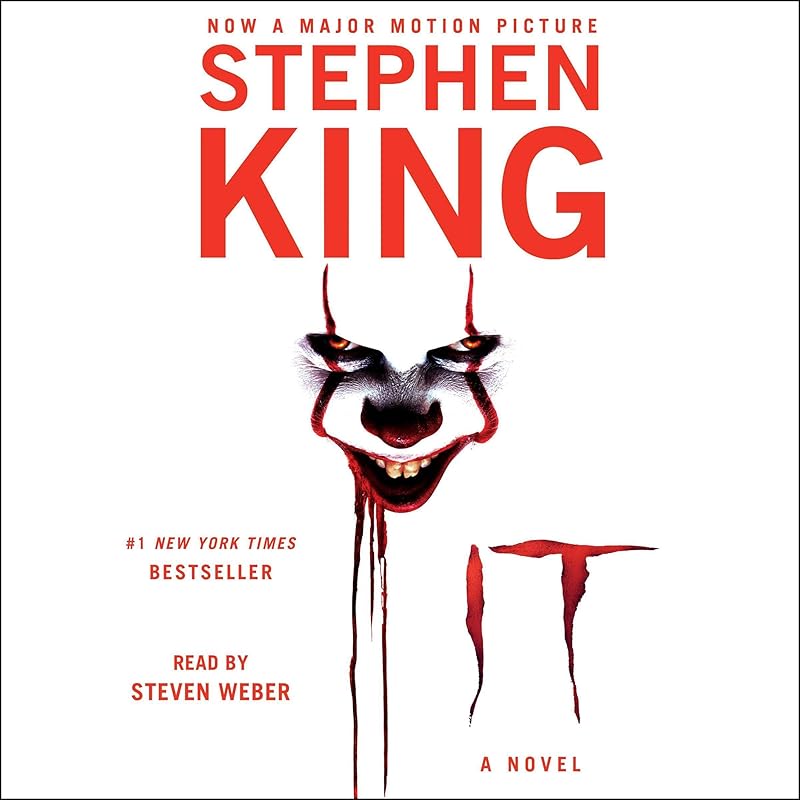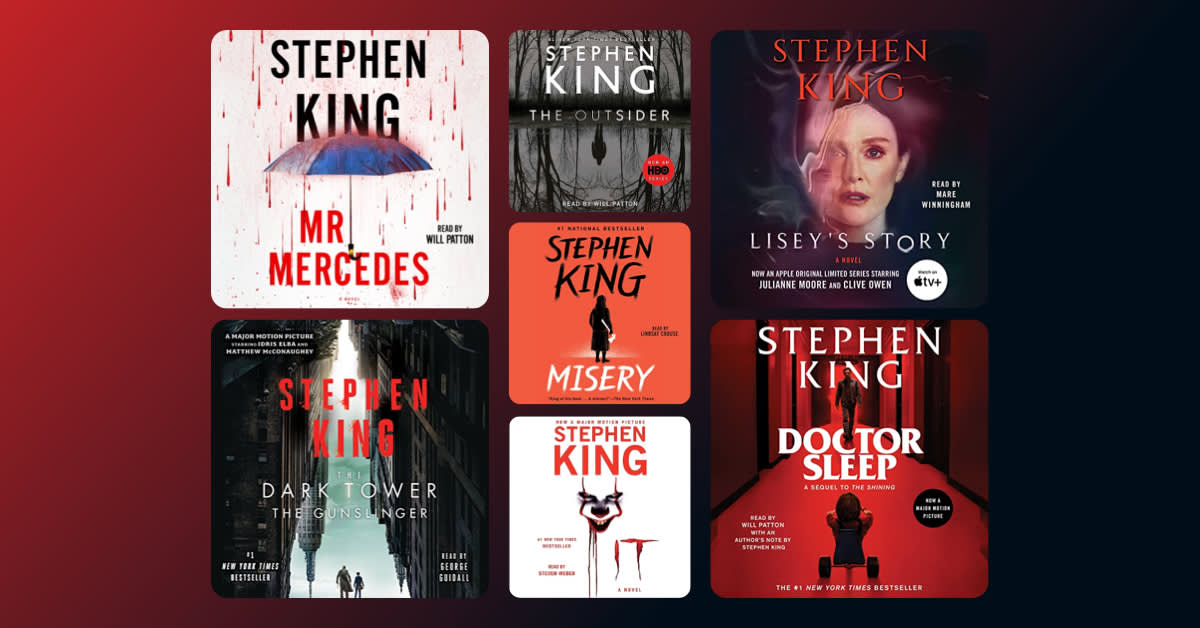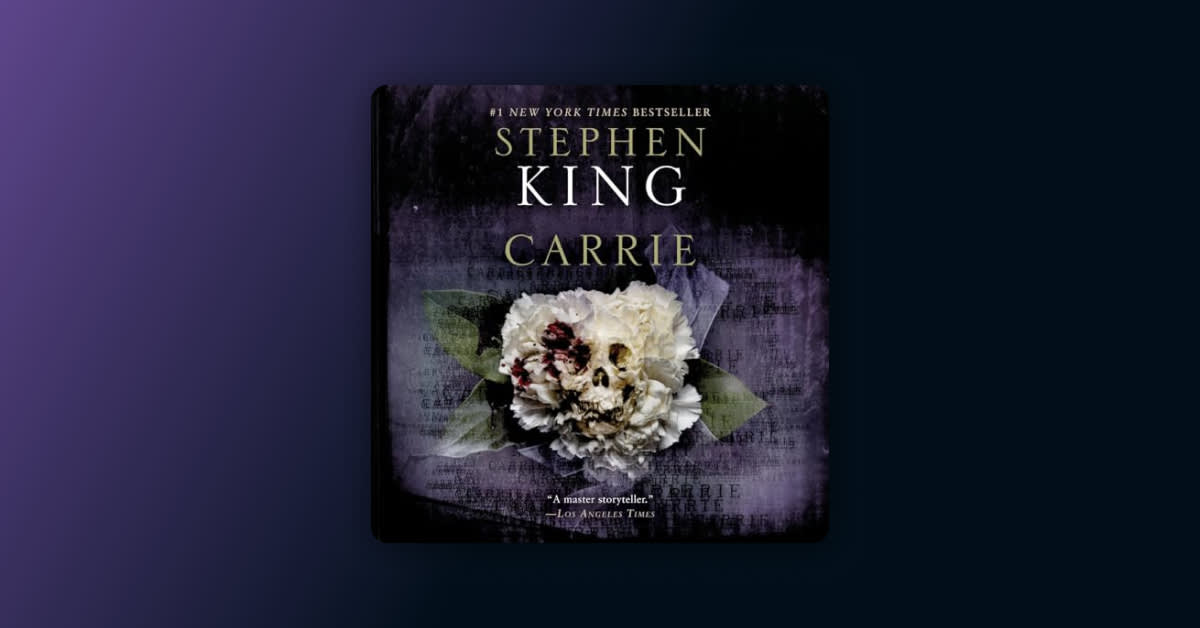There are few names in pop culture more immediately synonymous with the horror genre than Stephen King. After breaking into the literary scene with the publication of his 1967 short story "The Glass Floor," he continued to sell dark, compelling short fiction to magazines before making his full-length debut with 1974's smash hit Carrie, a novel that went on to inspire multiple film, television, and stage adaptations. But how does one follow up a book credited with the resurgence of horror fiction? Oh, just with two little novels you may have heard of called Salem's Lot and The Shining.
Since then, King has shown no signs of slowing down. With more than 65 published novels and novellas (and counting!) to his name, he has unequivocally cemented himself as the contemporary master of horror. While we anxiously wait to see what he'll come up with next, we're revisiting some of our favorite Stephen King audiobooks ever—from the stories that left us shaking with fright to those that offered new perspectives on the human condition.
Thinner reveals the true horror within
I remember my first Stephen King movie, watching Thinner as a teenager, and how it instantly became one of my favorites. It was unsettling watching Billy Halleck waste away (physically and emotionally) as his life spiraled into moral decay. I later read the book and recently listened to the audiobook, and it still remains one of my top picks. Thinner depicts how a simple curse can unravel one’s life—and expose the darkness that’s already hiding beneath the surface. Don't expect your typical ghosts and monsters here. Instead, you get this creepy psychological and supernatural story about guilt, privilege, and the terrifying consequences of personal accountability through Billy Halleck's haunting transformation. King likes to remind us that sometimes the scariest evil isn't coming from an outside force but from within ourselves.
Thanks, I hate it (by which I mean I love it)
My love of horror has always been a paradox—while I adore a mildly spooky tale or bit of horror-comedy camp, I judge “real” horror by how much it scares me. The scarier it is, the more it succeeds as horror—so the more it succeeds, the more I kind of hate it! By this twisted logic, Pet Sematary is both my favorite and least favorite Stephen King story. My visceral fear of both the novel and the kooky yet traumatizing 1980s film remains unabated by the years and development of my prefrontal cortex. King himself called this his scariest book. Why? Well, there’s its pit-of-despair message: “Sometimes dead is better,” a chilling echo of the world’s creepiest fable. There’s the family cat and adorable toddler, warped into malevolent villains by Louis Creed’s desperate attempts to reverse their fates. There’s the undeniably petrifying (and probably problematic) Zelda, who lives forever in my nightmares (thanks for that, SK!). And with the release of the instant-classic 2018 audiobook, there’s the iconic performance from Dexter’s Michael C. Hall, who brings the novel to life—one blood-curdling, can’t-listen/won’t-listen/MUST-LISTEN word at a time.
Carrie performed by Sissy Spacek = untouchable
Carrie, in my staunch yet humble opinion, is among the top three of all time when it comes to Stephen King’s work. I grew up watching the 1974 movie version of Carrie and loved everything about this tragic story of a socially isolated, telekinetic high school senior. So imagine how ecstatic I was that the audiobook was performed by none other than Sissy Spacek, the actor who first brought the character to life onscreen. I was intrigued to hear how she would portray all the other characters, and she knocked it out of the park, delivering the different POVs that build up to the eventual deadly breakdown of such a sympathetic character. Stephen King has an amazing ability to make fans understand his troubled protagonists. Whether in audio or onscreen, Carrie will always get its well-deserved 10s from me.
Check into the Overlook Hotel
While I had indulged in an appropriately scarring, ill-advised yet incredibly on-brand screening of Stanley Kubrick’s legendary adaptation of The Shining in my youth, it wasn’t until about six years ago that I finally got around to diving into Stephen King’s 1977 masterpiece. I didn’t look up from my weathered paperback for two days, an obsession that resulted in my holding up a Saturday night Dungeons & Dragons session just so I could see what would become of Jack Torrance. The terrifying story of a family who find themselves trapped in an isolated, snowbound hotel in the middle of the Rockies, The Shining is as claustrophobic and chilling as its setting. (I still haven't been able to shake a slight unease around topiary animals and firehoses after my time spent in the twisted world of the Overlook.) But it’s also so much more than an eerie account of malevolent spirits, a clairvoyant young boy, and a man’s gradual descent into madness—it’s a meditation on addiction, family, abuse, and redemption. It’s no wonder, then, that when King revisits the story in 2013’s Doctor Sleep that the narrative remains haunted by the cycle of dependency and trauma that possessed the story decades prior. This time, however, escape is possible, the promise of healing just within reach, concluding the Shining duology on a hopeful note befitting the heart of its predecessor.
The downside to fame
Like many millennials, I was introduced to the concept that a fan’s obsession could turn violent via Eminem’s 2000 hit song “Stan,” which, while unnerving, did little to discourage my generation from pursuing the spotlight. Stephen King’s 1987 classic novel Misery, on the other hand, is a decidedly horrific exploration of the sinister side of fandom that would make anyone think twice about building an audience. Misery is about a famous author who is lured into a trap by an enraged reader who demands he write a new novel after killing off her favorite character. It’s a twisted case of art imitating life, imitating art; a truly influential work that has managed to inspire parodies and parallels across decades, geography, mediums, and genres. In this standout audiobook, Lindsay Crouse brings King’s characters to life with an immersive performance that echoes long past the last line.
An evil-twin tale for the ages
I’ve devoured Stephen King's popular horror books since I was a teen—as well as his Dark Tower series—yet it's the vivid imagery of The Dark Half that resurfaces in my imagination at the oddest moments. When I first picked it up more than three decades ago, I didn't know the novel had been written in response to the outing of King's Richard Bachman pseudonym, but the tale of author Thad Beaumont's alter ego is one that haunts me to this day. Whether it's the concept of one twin absorbing the other in utero or the awesome power of sparrow murmurations, I enjoyed returning to hear these details narrated in the regular-guy voice of Grover Gardner, making me feel like he was enjoying the macabre tale with a wry smile along with me.
The perfect way to introduce the horror legend to your kids
You read that right. I’m something of a scaredy-cat. Until now, the only two Stephen King listens in my library were 11-22-63 and his creative nonfiction manifesto On Writing. I’m proud to say I now have a third, and it’s one I was able to share with my kids: Hansel and Gretel. In concert with the Maurice Sendak Foundation, King has reimagined one of Grimm’s classic fairy tales with a delicious creepiness that my whole family enjoyed. King performs the story, and includes an amazing personal introduction where he shares his admiration for Sendak and his own love for fairy tales, or, as he calls them, sunny tales with dark centers and brave, resilient children.
King takes us back in time
11-22-63 is a technicolor romp to the past where the root beer tastes better, cars have more class, and listeners are warned to beware the yellow card man. I was not alive in 1963, but after spending 30+ hours listening to narrator Craig Wasson bring these fictional (and real) characters brilliantly to life, I feel like while I didn’t live there, I’ve at least visited for a long weekend. Blending time travel, history, a little romance, and political intrigue, this is an oddly feel-good tale—odd because it's about assassination and comes from the king of horror. The thing is, King is also a masterful storyteller whose work has the capacity to both warm your heart and scare the hell out of you.
The price of survival
I found The Running Man while chasing something that would fill the void the season 1 finale of Squid Games left behind. I was craving a story about ordinary people pushed to the edge, forced to survive in a system rigged against them. Written under King’s pseudonym Richard Bachman, it’s set in a grim, near-future America where the poor compete while the rich stay entertained by watching them fight for their lives on television. Desperate to save his family, Ben Richards volunteers for a game that makes him both the hunted and the prize. The tension never lets up. Every chapter feels like another close call, another impossible escape, and keeps you listening to see if Ben will make it out alive. Narrator Kevin Kenerly adds a layer of tension to the story that makes every moment feel like it could turn deadly.
M-O-O-N, that spells I forever stan The Stand
The Stand was the novel that made me love Stephen King, after years of being merely terrified by him, when I read it at 13. (It was, even in paperback, an absolute unit: a badge of adulthood I toted proudly all summer; longer than any other book I would read as an actual adult.) Decades later, I found myself helplessly sucked into the audio version as King vividly depicts how the gnarly superflu Captain Trips spreads and shuts down society within weeks. Sure, it’s long, but here length is a luxury. King gives his band of survivors time to grow as characters, and gives himself time to dawdle on harrowing scenes and unforgettable stray details: those who die, amid the chaos of superflu, of other causes; the banal artifacts, like Teenage Mutant Ninja Turtles comics, that survive. Grover Gardner’s performance is a luxury too, switching from straightforward to folksy, murderous, romantic, or gleefully gross—this being King, after all. Having spent more than 47 hours with his voice (by the way, I listened at 1.2x speed 💪), I can think of no one better to take the reins of this towering saga.
Can’t get enough of It
I have listened to It many times, and I still can’t get enough! At nearly 45 hours, the book has no dragging parts because every word is essential for understanding the powerful, shocking story. As always, King is a mastermind with the beautiful attention to detail he gives to every character’s background and inner thoughts. It’s captivating and sucks you into Derry, a town with a dark history, scary present, and uncertain future. If you’re like me and saw the TV movie (or the newer films) before listening to the novel, you will be shocked by how different it is! The book makes you feel as if you have lived in Derry all your life, and Steven Weber’s genius narration shows his incredible range. Whether you prefer Tim Curry or Bill Skarsrgård as Pennywise, wait until you hear what Steven Weber can do with only his voice. The performance will give you chills!
Stephen King for beginners
Looking for an accessible entry point for Stephen King’s undeniably extensive oeuvre? Newcomers need not look further than Different Seasons. The quartet of stories, each loosely tied to one of the four seasons, fully flexes the narrative strengths behind King’s renown. The prison escape novella Rita Hayworth and Shawshank Redemption hums with King’s knack for character development and skewers the prison system with a deft focus on humanity and hope. By contrast, the chilling second installment, Apt Pupil, is a testament to the author’s capacity for building dread, a disturbing work where evil stems not from the supernatural but from the depravity lurking in the most unexpected of everyday people. King’s finesse for coming-of-age stories shines in The Body, a stunning exploration of young men coming to terms with their mortality after a grim discovery; meanwhile, he’s back to his macabre roots with The Breathing Method, a frame narrative that recalls an unthinkable feat of unconditional love. Each story demonstrates why King is the pillar of his genre—sure, there are some frights, but it’s in exploring the human condition in all its shades and seasons, all its light and dark, violence and tenderness, that the singular brilliance of his work lies.

























